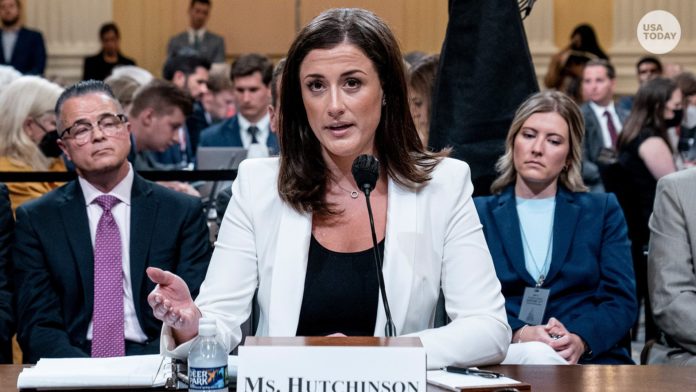
On today’s episode of the 5 Things podcast: Trump knew Jan. 6 mob was armed and dangerous, witness says
Congress reporter Candy Woodall recaps the Jan. 6 committee’s Day 6 hearing. Plus, NATO countries gather at a summit in Spain, Deputy Managing Editor for Enterprise Cristina Silva looks into how some states make it hard for LGBTQ people to adopt, R. Kelly will be sentenced and the iPhone turns 15.
Podcasts:True crime, in-depth interviews and more USA TODAY podcasts right here.
Hit play on the player above to hear the podcast and follow along with the transcript below. This transcript was automatically generated, and then edited for clarity in its current form. There may be some differences between the audio and the text.
Taylor Wilson:
Good morning. I’m Taylor Wilson and this is 5 Things you need to know Wednesday, the 29th of June, 2022. Today the latest revelations from another January 6th hearing, plus how some states make it hard for LGBTQ people to foster or adopt children, and more.
Here are some of the top headlines:
- Ghislaine Maxwell has been sentenced to 20 years in prison. Last year, she was convicted of sex trafficking, among other charges, for helping Jeffrey Epstein abuse underage girls.
- A jury to decide Florida school shooter Nikolas Cruz’s sentence has been decided. The group will decide whether the 23-year-old receives a death sentence or life in prison after he murdered 14 students and three staff members in Parkland, Florida in 2018.
- Two top pharmacy chains are setting purchase limits on Plan B emergency contraceptive pills. Rite Aid and CVS made the moves as demand spikes following the Supreme Court’s reversal of the Roe v. Wade decision that had legalized abortion.
♦
The committee investigating the January 6th attack on the Capitol presented what it called recently obtained evidence and heard more witnesses yesterday in something of a surprise hearing. USA TODAY Congressional Reporter Candy Woodall has a recap.
Candy Woodall:
The special committee investigating the January 6th, 2021 violence brought in a star witness, former White House aide, Cassidy Hutchinson. Now this is someone who was a five-second walk away from the Oval Office. She was in daily meetings with top-level White House staffers. Her boss was Mark Meadows, the Chief of Staff to President Trump. She talked to cabinet officials every day, White House lawyers, and was often in the room with Trump himself.
Her testimony wasn’t just one bombshell, it was many. Her testimony described a former president who knew there was an armed mob at his Stop the Steal rally on January 6th, and he directed that armed mob to the US Capitol, according to her testimony.
There were other bombshells, including that, in his final days, the former president was so unhinged that he assaulted a secret service agent in his attempt to grab the steering wheel and join the mob at the Capitol. They were telling him that they had to take him back to the West Wing. They could not go there.
He also reportedly threw a porcelain plate on the wall after learning his former attorney general, Bill Barr, said there was not widespread fraud in the 2020 presidential election. This is all according to Hutchinson’s testimony.
She also testified what has been previously reported, which is that as the violence was playing out at the US Capitol and police were being assaulted and people were dying, and there were chants outside to hang his vice president, former Vice President Mike Pence, that he was in the Oval Office refusing to act, and that his chief of staff said he doesn’t want to do anything. He did not want to do anything to stop the violence. Those are among the most shocking and revelatory things that Cassidy Hutchinson testified to today.
Taylor Wilson:
Coming up on tomorrow’s show, you can hear from Justice Department correspondent Bart Jansen, to dig into what could be coming from the January 6th hearings.
♦
World leaders, including President Joe Biden, are gathering in Madrid today. The summit comes amid what NATO Secretary General Jens Stoltenberg said is “the most serious security crisis we have faced.” He said the military alliance faces its biggest challenge since World War II amid the war in Ukraine. Ukrainian President Volodymyr Zelensky is also expected to address the 30 leaders by video as Russia’s invasion moves into its fifth month.
The gathering has already seen Turkey lift its objections to Sweden and Finland joining NATO. The alliance operates by consensus, and Turkish President Recep Erdoğan had threatened to block the Nordic pair, insisting that they change their stance on Kurdish rebel groups that Turkey considers terrorists. After weeks of diplomacy, Turkey said it got what it wanted.
Meanwhile, the host, Spanish Prime Minister Pedro Sanchez told the AP what he sees as the summit’s goals.
Pedro Sanchez:
A message of unity. I believe that this is a summit of democracies that want to send a message of unity in the defense of our common values, which are democracy, freedom, and international order based in the rule of law, and, of course, our security, which is, unfortunately, under threat because of this illegal invasion of Putin of Ukraine.
Taylor Wilson:
Sanchez added that NATO should send a message of deterrents to Russia amid its invasion, but that Spain and other NATO countries have been reserved in their responses to the conflict to avoid escalation.
♦
More states are making it harder for LGBTQ people to foster or adopt children. 5 Things producer, PJ Elliott, spoke with Deputy Managing Editor for Enterprise Cristina Silva to find out more
Cristina Silva:
So in the ’80s and ’90s, there was a movement to make it difficult for LGBTQ couples to adopt or foster. Then those started to be repealed in 1999. New Hampshire became the first state to repeal those measures. And so, since the Supreme Court made gay marriage the law of the land in 2015, we’ve seen a new backlash against these kinds of couples, and more states than ever are making it difficult so that these couples cannot foster or adopt.
The thing is this is about charity groups or organizations that are funded by state money or federal money. And so, basically these states are saying to these private organizations, these contractors, “It’s okay for you to say you don’t want to work with these couples. We’re going to let you continue to use taxpayer-funded money and not work with these couples.” Under the Trump administration, the federal government went along with that as well. So now that’s the case when it comes to these contractors.
Then separately from that, many same-sex couples are having children through IVF or other fertility treatments. Even in that case, if one person is the one who delivers the baby and the other person did not, they have to adopt the child under many state laws to still have rights to the child. And so, these are some of the ways that it is becoming more hard for these kinds of families to exist.
PJ Elliott:
Is there any concern from the LGBTQ community that this Supreme Court may make it even harder than it already is for them to adopt or foster?
Cristina Silva:
Well, actually in 2001, the Supreme Court did weigh in on one of these cases. It was in the City of Philadelphia, where Philadelphia was saying, “We’re not going to work with contractors that refuse to work with LGBTQ couples.” Actually Supreme Court Chief Justice John Roberts said, “We have to protect the rights of same-sex couples. But in this particular case, we’re going to allow this to happen. Philadelphia should work with this contractor.”
And so, both sides see this as a victory. Progressives see this as a victory because the decision was written so narrowly to only apply to this particular instance in Philly. But conservatives see as a victory and saying this is a precedent that could apply then to others.
So right now there’s not a case that’s on the docket or anything like that, but that could happen in the future. Then, more importantly, because Justice Clarence Thomas mentioned in his opinion on abortion that we can revisit some of these issues that were not originally written to the Constitution, such as the right to gay marriage, people are worried that those rights could eventually be struck down. If that happens, if these couples are not … If their marriages are not recognized, that could make it even harder for them to grow their families because some contractors might not want to work with couples who are not married, which is what we saw in the past before the 2015 ruling on gay marriage.
♦
Taylor Wilson:
R. Kelly is set to be sentenced today. A New York City jury found the R&B star guilty of racketeering and other counts at his sex trafficking trial last year. Prosecutors alleged that Kelly’s entourage of managers and aides who helped him meet girls and keep them silent amounted to a criminal enterprise. Several accusers testified in graphic detail during the trial, alleging that Kelly subjected his victims to sadistic acts when they were underage. A warning, the following has graphic details of sexual violence.
One accuser said he sexually abused her when she was a teenager, forced her to have sex with another man, and trained her to defend him in public. Prosecutors are pushing for R. Kelly to serve at least 25 years behind bars. Kelly’s lawyers have argued he deserves a maximum of 17 years in prison under federal sentencing guidelines.
♦
It’s been 15 years since the iPhone first went on sale.
Steve Jobs:
These are not three separate devices. This is one device and we are calling it iPhone. Today Apple is going to reinvent the phone.
Taylor Wilson:
The release brought a new era of technology, the age of the smartphone. Before June of 2007, social media was barely a thing, and cellphone cameras were extremely basic. The iPhone then was named as Time Magazine’s Invention of the Year, and even that might have been an understatement. Today Apple estimates about more than a billion of the world’s nearly eight billion people use the device. Jobs, who died less than five years after announcing iPhone, said at the time, “We are all born with the ultimate pointing device: our fingers. An iPhone uses them to create the most revolutionary user interface since the mouse.”
Thanks for listening to 5 Things. You can find us seven days a week on Apple Podcast, Spotify, your smart speaker device, or wherever you’re listening right now. Thanks to PJ Elliott for his great work on the show, and I’m back tomorrow with more of 5 Things from USA TODAY.








